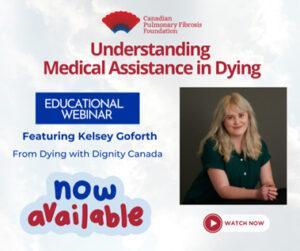In response to several requests for more information about medical assistance in dying (MAiD), CPFF hosted a webinar on October 24 to help increase understanding of the complex processes involved with accessing MAiD.
During this webinar, Dying With Dignity Canada’s (DWDC) Director of Programs Kelsey Goforth outlined the history and court cases that gave rise to the current MAiD legislation, Bill C-7, which came into effect in March 2021; eligibility; the process to access MAiD; safeguards; resources available to patients and providers; some relevant statistics; as well as addressing questions from the audience, including considerations for people with pulmonary fibrosis (PF).

Read on for a few highlights of the presentation.
Eligibility
To access MAiD, patients must be over 18 and be a Canadian citizen or permanent resident with access to publicly funded health services in Canada. You must be capable of making decisions. Your request must be voluntary without external pressure and your consent must be informed and you must receive counseling.
Finally, you must be living with a “grievous and irremediable medical condition;” a serious illness, disease or disability, in which you are in an advanced state of decline that cannot be reversed. You must be experiencing unbearable physical or mental suffering from an illness, disease, disability or state of decline that cannot be relieved under conditions that you consider acceptable.
Two tracks
There are two “tracks” for MAiD, based on whether or not the patient has a “reasonably foreseeable natural death.”
Patients who have a reasonably foreseeable natural death (Track 1):
- Can request MAiD provision immediately
- Can complete a Waiver of Final Consent (which allows MAiD to still take place if the patient loses the ability to consent at the time of the procedure, but has already made a written request, has met with a provider and has set a date.)
- Must be informed of treatment options
- Have approval by two independent assessors
Patients who do not have a reasonably foreseeable natural death (Track 2):
- There is a minimum 90-day assessment period
- Must offer consent immediately before MAiD provision (no Waiver of Final Consent)
- Must be informed of, and seriously consider, available means to relieve suffering
- Obtain approval by, or consultation with, a medical practitioner that has expertise in the condition
Patients with PF could be assessed as Track 1 or Track 2, based on the prognosis from their respirologist, their symptoms, other factors and their quality of life.
Process
- Make your formal request. You can do this asking your family physician or a specialist on your medical team, or by contacting your provincial MAiD coordination service. You can find provincial tools and MAiD request forms on the Dying With Dignity Canada website.
- Assessment process. Once your request is made, your assessment will begin and you will meet with a MAiD provider – in-person or virtually.
- A written request form will need to be completed and witnessed by one “independent witness” at any point in the process and given to the MAID provider. There are several conditions to be met by the independent witness. If you need help finding an independent witness, Dying With Dignity Canada’s Independent Witness Program can help connect you with trained volunteers to sign your request for medical assistance in dying (MAiD).
- The provision of MAiD. This involves choosing a location, date and time with your MAiD provider.
It is important to note that you can withdraw your MAiD request at any time.
You should also note that a request for MAiD in an advance directive/advance care plan will not be honoured.
A few statistics
Number of MAiD Deaths
- In 2021, there were 10,064 MAiD provisions reported in Canada, accounting for 3.3 per cent of all deaths in Canada.
- Total number of MAiD deaths since federal legislation was passed in 2016 is 31,664.
Profile of MAiD Recipients
Average age in 2021 was 76.3 years
- Underlying medical conditions:
- Cancer (65.6%)
- Cardiovascular conditions (18.7%)
- Chronic respiratory conditions (12.4%)
- Neurological conditions (12.4%)
Other resources
Dying With Dignity Canada provides a wealth of information and resources on MAID.
DYDC MAiD Navigational Support:
- [email protected]
- Phone: 416-486-3998
- Toll free: 1-800-495-6156
Bridge C-14 provides support for both the person and loved ones throughout all stages.
MAiD Family Support Society (formerly Bridge 4 You) provides 1:1 peer support for those who are supporting or supported a loved one through an assisted death.
For a more personal account of MAiD, read about how Frank Driscoll, who had IPF, chose medical assistance in dying to end his life as he wished, at home with family.


